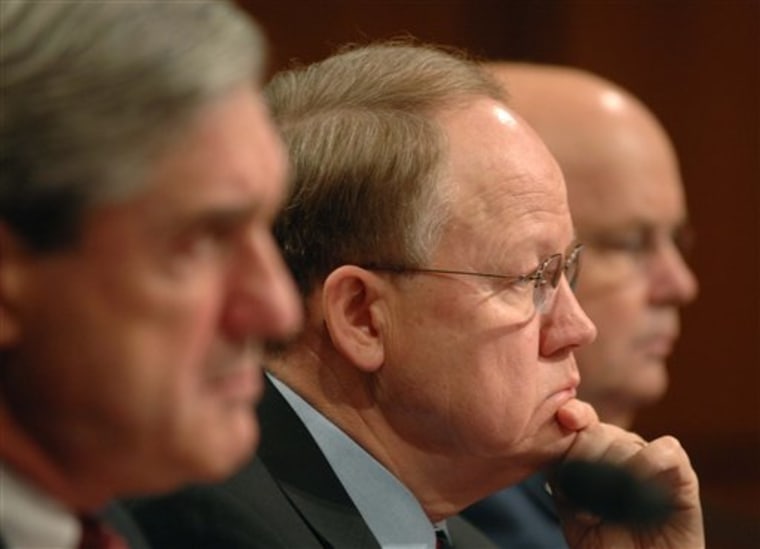Al-Qaida, increasingly shut down in Iraq, is establishing cells in other countries as Osama bin Laden’s organization uses a “safe haven” in Pakistan’s tribal region to train for attacks in Afghanistan, the Middle East, Africa and the United States, the U.S. intelligence chief said Tuesday.
“Al-Qaida remains the pre-eminent threat against the United States,” Mike McConnell told a Senate hearing more than six years after the 9/11 attacks.
He said that fewer than 100 al-Qaida terrorists have moved from Iraq to establish cells in other countries as the U.S. military clamps down on their activities, and “they may deploy resources to mount attacks outside the country.”
The al-Qaida network in Iraq and in Pakistan and Afghanistan has suffered setbacks, but he said the group poses a persistent and growing danger. He said that al-Qaida maintains a “safe haven” in Pakistan’s tribal areas, where it is able to stage attacks supporting the Taliban in Afghanistan.
The Pakistani tribal areas provide al-Qaida “many of the advantages it once derived from its base across the border in Afghanistan, albeit on a smaller and less secure scale,” allowing militants to train for strikes in Pakistan, the Middle East, Africa and the United States, McConnell said.
Terrorists use the “sanctuary” of Pakistan’s border area to “maintain a cadre of skilled lieutenants capable of directing the organization’s operations around the world,” McConnell told the Senate Intelligence Committee.
Next strike seen from Pakistan
The next attack on the United States will most likely be launched by al-Qaida operating in “under-governed regions” of Pakistan, Adm. Michael Mullen, chairman of the Joint Chiefs of Staff, planned to tell Congress on Wednesday.
“Continued congressional support for the legitimate government of Pakistan braces this bulwark in the long war against violent extremism,” Mullen states in remarks prepared for a separate budget hearing and obtained by The Associated Press.
The U.S. has expressed growing concern that al-Qaida figures who fled Afghanistan after the ouster of the Taliban regime in 2001 have been able to regroup inside tribal regions, posing a threat not just to U.S. forces across the border, but offering a potential base for global operations.
U.S. officials have said they believe that bin Laden is taking refuge in the Pakistani tribal region, likely on the Pakistani side of the border.
Still, McConnell praised Pakistan’s cooperation in the fight against extremists, saying that hundreds of Pakistanis have died while fighting terrorists. He said Islamabad has done more to “neutralize” terrorists than any other partner of the United States.
Despite the Pakistani cooperation, Lt. Gen. Michael Maples, director of the Defense Intelligence Agency, said the Pakistani military has been unable to disrupt or damage al-Qaida terrorists operating in the tribal border region. And the U.S. military is prohibited by Pakistan from pursuing Taliban and al-Qaida fighters that cross the border to conduct attacks inside Afghanistan.
McConnell also told the Intelligence Committee that the Taliban, once thought to be routed from Afghanistan, has expanded its operations into previously peaceful areas of the west and around the capital of Kabul, despite the death or capture of three top commanders in the last year.
At the same hearing, CIA Director Michael Hayden publicly confirmed for the first time the names of three suspected al-Qaida terrorists who were subjected to a particularly harsh interrogation technique known as waterboarding, and why.
“We used it against these three detainees because of the circumstances at the time,” Hayden said. “There was the belief that additional catastrophic attacks against the homeland were inevitable. And we had limited knowledge about al-Qaida and its workings. Those two realities have changed.”
Hayden said that Khalid Sheik Mohammed — the purported mastermind of the 9/11 terrorist attacks on the United States — and Abu Zubayda and Abd al-Rahim al-Nashiri were subject to the harsh interrogations in 2002 and 2003. Waterboarding is an interrogation technique that critics call torture.
Waterboarding induces a feeling of imminent drowning with the restrained subject’s mouth covered and water poured over his face.
“Waterboarding taken to its extreme, could be death, you could drown someone,” McConnell acknowledged. He said waterboarding remains a technique in the CIA’s arsenal, but it would require the consent of the president and legal approval of the attorney general.
North Korea concerns
In other troubling parts of the world, the intelligence director said North Korea was proceeding with a nuclear program despite an agreement last year to suspend operations and Iran was “keeping open the option” of building nuclear weapons.
The United States remains “uncertain about Kim Jong Il’s commitment to full denuclearization, as he promised in the six-party agreement,” McConnell said, referring to the North’s leader and to the nuclear talks involving the U.S., the Koreas, Japan, China and Russia.
Increases in military spending have enabled Russia to reverse deterioration of its military forces that set in as the Soviet Union collapsed, McDonnell said, and China’s military modernization “will put American forces at greater risk.”
Also testifying, FBI Director Robert Mueller said al-Qaida continues to present a “critical threat to the homeland” and warned that “homegrown terrorists” not directly linked to al-Qaida posed a threat as well.
After terrorism and weapons of mass destruction, McConnell said the threat from cyberattacks to U.S. information systems is the most pressing issue. President Bush signed a classified directive in January outlining steps the federal government is taking to protect its networks.
“It is no longer sufficient for the U.S. government to discover cyber intrusions in its networks, clean up the damage and take legal or political steps to deter further intrusions,” McConnell said.
On Cuba, he said the intelligence community is not expecting an immediate political convulsion if ailing President Fidel Castro dies.
“We assess the political situation in Cuba will at least remain stable in the first few months after Fidel’s death,” McConnell said.
But policy missteps on the part Castro’s successor could lead to mass migration of Cubans to the United States, he said.
